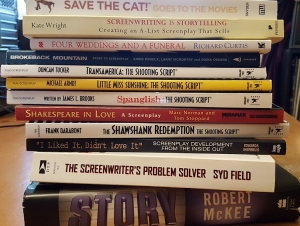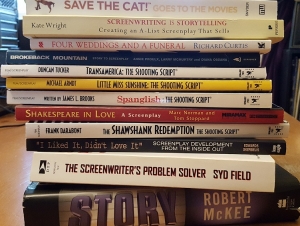 I just had a wonderful Skype call with a TV-film producer and writer friend who always inspires me. Sometimes, just talking about projects is inspiring. But often it’s the little bits, the insights, that give me a boost I didn’t know I needed. When I say “boost,” it can be both positive and negative.
I just had a wonderful Skype call with a TV-film producer and writer friend who always inspires me. Sometimes, just talking about projects is inspiring. But often it’s the little bits, the insights, that give me a boost I didn’t know I needed. When I say “boost,” it can be both positive and negative.
Here are some tips I’ve collected over the years, and some most recently (like on this call), which, I think, will give you, as a writer, some much needed perspective.
Stop being sensitive.
Yes, your sensitivity is what makes you an above-average screenwriter. It gives you the ability to so deftly tap into other’s feelings, motivations and shortcomings.
But when it comes to your career, put this quality to rest for the business side of things. Here’s what I mean:
If someone passes on your script, don’t take it personally. The material may not be what they’re looking for. It doesn’t always mean your protagonist isn’t complex enough. (a.k.a. “I must suck as a writer.”)
Don’t get bogged down in the minutia of your story.
It doesn’t matter what your protagonist eats for breakfast, their favorite sports team, preferred method of loading a dishwasher UNLESS any of that information is vital to the story. Any backstory that doesn’t appear on screen is on a need-to-know basis. If some of your character’s backstory comes into play later, only then should you know it. Otherwise, don’t waste your time on writing a novel-length version of your protagonist’s likes and dislikes.
Opinions from other writers don’t matter as much as you think—even the positive feedback.
WHAT?!! I know—I myself belong to a writers’ group and have belonged to a screenwriters’ group in the past. Sometimes these groups can help you identify problems in your story, your premise, weaknesses—all to help improve your craft.
However, in the final analysis, the feedback from a producer or studio executive is all that will determine whether or not you sell your script. Painful as it may be to hear, trying as hard as you do to write that bulletproof script, many scripts are sold because a producer was excited about the concept and never actually read the script.
Yikes! I know. And I’m a script consultant.
This isn’t to say it’s not important to be a good writer. You want that reputation in order to secure writing assignments. But when it comes to what you actually sell, maybe not so much. You’ve heard of projects getting sold because a producer simply liked the idea and said, “Now go write the script.” You bet you need to know craft if that happens. But still, in some instances, the concept is what sold the script.
Stop buying screenwriting books.
If you’ve been writing for a while, chances are, you have bookshelves filled with Syd Field, Robert McKee, Blake Snyder, Dr. Linda Seger, even Aristotle himself. Do you think by now there’s still some stone you’ve left unturned?
Why, you ask, am I doing a screenwriting blog then? Well, this blog is meant for those  who are starting out or in a place in their growth where they may still benefit from information about craft. I still believe that craft is important.
who are starting out or in a place in their growth where they may still benefit from information about craft. I still believe that craft is important.
If, however, you’ve been writing for a while, you need to turn your attention more to getting noticed and selling your work—topics I will also cover in this blog. Screenwriting is a two-part undertaking—you write, then try to sell. Mastering both parts is critical to your success.
You may have to do things you don’t like.
I’m shocked by stories I’ve heard about new writers who seem to think they can make so many demands right out of the gate. Rarely is that the case. The powers-that-be want to know, besides your ability to write dizzyingly awesome scripts, can they work with you? Are you someone they will want to spend time with? Or do you have an ego the size of Montana?
Some of you want to write, sell and walk away. This was my plan for a long time. I thought, I’d be in my fantasy writer bubble, then give away my work (for a price), and on to the next. It may surprise you to learn that for your first sale, you may have to get your hands dirty, and, oh I don’t know, get more involved in the process of filmmaking! Once you have a credit or two under your belt, you may then be able to crank out scripts and specialize the way you’d wanted.
Think like a producer.
While you’re immersed in the world of your story, a producer is concerned with money. It really is that simple. You may get notes that relate to financial constraints, and you have to be flexible.
Imagine that you are funding the project based on your script. If the budget is too high, and a producer asks you to cut it down to two locations, you do it. If they need one character cut, you make it work without that character. Of course there are times when it’s okay to go to bat for something you truly believe in. But be wise—pick your battles. It isn’t worth losing an opportunity. Think of it as a challenge, a puzzle that only you can figure out. That way, you’ll get a good reputation as someone the producer will recommend to work with in the future.
Want to meet someone who will buy your script? You can’t.
This is probably the most frustrating tip of all. But when you think about it, it really makes sense. I recently attended a virtual event where the speaker basically told us to seek out people who make the films we like. Then in the next breath, they essentially said you can’t reach out to those people who make those films. Whaat?? Here’s why:
Pretend you’re standing on the stage of a stadium filled with people, like the audience at a rock concert. Now imagine every one of those people wants to email you a script to read. Are you going to read every script from millions of people? And let’s be honest—many of those scripts are going to be bad or mediocre. Of course you won’t. You have to find a way to filter the information, or you’ll get scripts coming at you like a fire hose and completely wasting your time. Your filter is made up of people you trust—family, friends and, if you’re successful, assistants or staff whose job it is to seek out material for you. This is called vetting.
It’s the reason why many writers choose to enter prestigious contests. Placing high in contests like the Nicholl, BlueCat or Sundance shows that you have talent, that it may not be a waste of a producer’s time to read your script.
Other ways to be vetted include:
- A good friend recommends your work to their agent.
- A pipeline of people—a friend of a friend who knows you says something good about you.
- A stroke of luck. This could include a logline on social media that catches a producer’s attention. Or you query someone who requests to see your script because you caught them when they had some extra time.
It’s maddening, I know. It reminds me of a high school popularity contest. But who were the school kids whose names you knew, and who were the ones you didn’t? It doesn’t mean the kids you didn’t know weren’t talented or worth knowing. But guess what? The kids you already knew saved you the time and effort of finding out who they were. In the real world of business—and the film industry IS a business—it takes time to look up someone, find out about their level of experience, find out whom they’ve worked with, make sure they’re not a stalker or serial killer.
Vetting may feel annoying to us writers, but from the other perspective, it’s necessary.
If any of this hasn’t demolished your dream of screenwriting success, good. That’s the biggest tip of all. You have to have a thick skin and nerves of steel to handle the many ups and downs that will most likely come your way. If you’re prepared for that, you’re already halfway to success!
Need someone to read your script and give you honest, useful feedback? Click here for screenwriting consultation.
Renée Lukas is a screenwriter, an Academy Nicholl Quarterfinalist and a reader for BlueCat Screenwriting Competition. She’s also the author of four novels: The Comfortable Shoe Diaries, Hurricane Days, Southern Girl and In Her Eyes (Bella Books).



